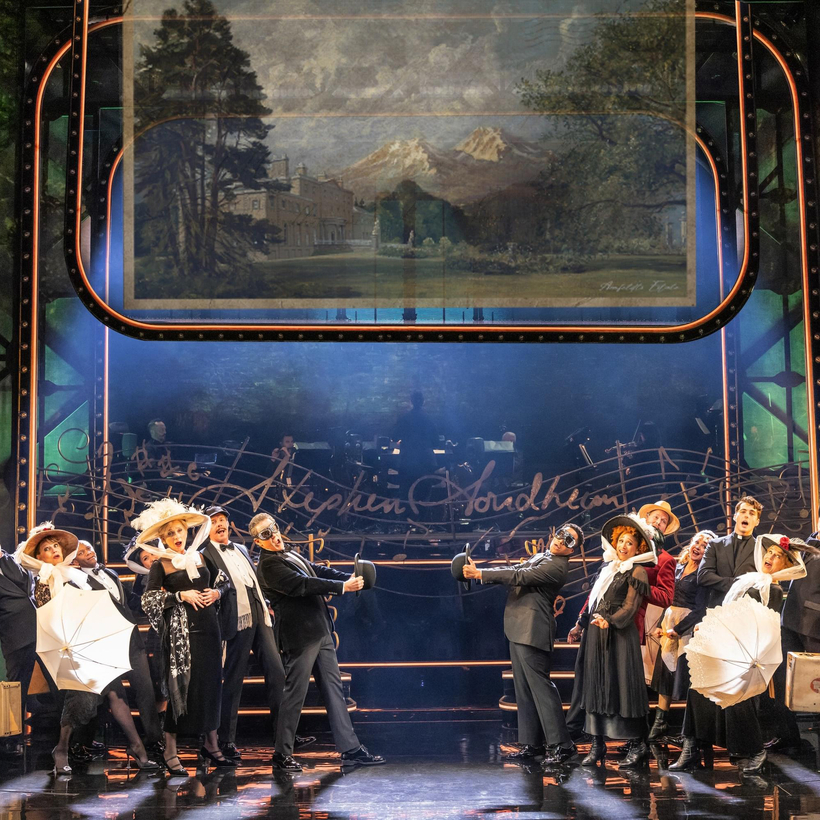As he struggled to write what would turn out to be his last musical—Here We Are—Stephen Sondheim turned to his friend of 45 years, the producer Cameron Mackintosh, for help. He was, he admitted, drying up artistically and was unable to complete the second act. “He was worried that what he’d written sounded like his other songs,” Mackintosh says. “He kept saying, ‘Haven’t I written that before?’ It was an excuse not to write.”
He turned to Mackintosh “because most of his friends and collaborators had died, and I was the only one left he could go through the show with, to hear my pluses and minuses.” Mackintosh did what good producers and friends do: he encouraged. He thought there were five “really good pieces of material” in what Sondheim had written up to that point and prodded him to get back to work. But it was not meant to be. Four days after their phone conversation, Sondheim came home from a Thanksgiving dinner with friends in Roxbury, Connecticut, and died, at age 91.

Here We Are opened in New York in 2023, two years after Sondheim’s death. The reviews for the unfinished show were respectful but unenthusiastic. And Sondheim had been right: some of the songs echo better ones from earlier musicals such as Sunday in the Park with George, Into the Woods, and Passion.
Here We Are is not a good musical. Far better, and far more moving, is Stephen Sondheim’s Old Friends, the revue of Sondheim songs that Mackintosh has brought to Broadway after successful runs in London and Los Angeles. Starring Bernadette Peters, still unforgettable as Dot in the original Sunday in the Park with George, and a radiant Lea Salonga, it opens April 8 at the Samuel J. Friedman Theatre.
The word around town is that the show is Mackintosh’s salute to his old friend, put together after his death. But in fact, Sondheim had a hand in planning it. Mackintosh had produced two Sondheim revues before—Side by Side, in 1976, and Putting It Together, in 1993. He had no intention to do another. And then “Steve rang me up during COVID and said, ‘It’s time we do a third one.’”

Matthew Bourne, who staged the all-male Swan Lake for Mackintosh back in 1995, has directed the revue with flare and sensitivity. Peters breaks your heart with a wistful “Send In the Clowns.” Salonga displays fine comic chops as Mrs. Lovett singing “A Little Priest” from Sweeney Todd. And the first-act finale, as the cast assembles to re-create Georges Seurat’s painting A Sunday Afternoon on the Island of La Grande Jatte, is nearly as thrilling as it was in the original production of Sunday in the Park with George.
Mackintosh is not quite sure when he first met Sondheim. He has a vague idea that it was at a party in London thrown by Burt Shevelove, who wrote A Funny Thing Happened on the Way to the Forum with Sondheim. “I was pre-pubescent,” he says, with a laugh. Ned Sherrin, the broadcaster and director “and a great purveyor of young gentleman around London,” took him to the party. Mackintosh, who’d been a performer in Oliver!, was soaking up the theater like “blotting paper.” He knew of Sondheim but wasn’t yet aware of his importance in musical theater. “I had seen West Side Story and Forum and just thought of Steve as one of the writers.”
The friendship took hold when Mackintosh, now making his way as a young producer, decided to bring Sondheim’s Side by Side, a little revue running in a suburb of London, to the West End. “I hadn’t even seen it,” he says. “I was in New York. I had a cheap airline ticket to get there, so cheap I wasn’t in the back of the plane, I was outside the plane. Ned Sherrin called me and said, ‘You have to do this show.’”
By then, Mackintosh was aware of Sondheim’s importance, but he also knew that his commercial possibilities were iffy at best. He’d seen Company, Sondheim’s show about a bachelor surrounded by married couples, not all of them happy, and all of them cynics, and thought the show “was not emotionally satisfying. If I had six pairs of friends like these, I’d leave town.”
Still, Sondheim got good reviews, even if his shows sometimes “closed during technical rehearsals,” Mackintosh says. He decided to take a chance on Side by Side. He remembers thinking, “This will get me decent notices even if it doesn’t make any money.”
The show worked and cemented the friendship.
Sondheim had a reputation for being aloof and prickly, but Mackintosh found him down-to-earth. “We rarely had intellectual conversations,” he says. “We laughed and we drank. I was on a learning curve in the theater, and Steve picked up on that. He was, above all, a great teacher. I learned so much watching him work with the cast. He taught them how to perform his songs in a practical way. There was nothing pretentious about it.”
At the same time Mackintosh was learning from Sondheim, he was building a relationship with Andrew Lloyd Webber. They did Cats in 1981, and it became a blockbuster. And then they did The Phantom of the Opera, which opened on Broadway the same season as Sondheim’s Into the Woods. The two shows went up against each other at the 1988 Tony Awards. Broadway politics swirled around the awards.

The mighty Shubert Organization, which had The Phantom of the Opera at the Majestic Theatre, was pressuring Tony voters to crown a show that was shaping up to be even more successful than Cats. Meanwhile, the scrappy Jujamcyn Theaters, which had Into the Woods, was positioning Sondheim as the great American composer who stood against the rushing tide of Andrew Lloyd Webber and Cameron Mackintosh spectacles.
Mackintosh and Sondheim were having none of it.
“It made no difference to us,” Mackintosh says. “We had a brilliant friendship that lived outside of the business. I’m sure he could not abide some of The Phantom, but he understood what drove me. He knew I was doing the best I could for the show. He appreciated my craft [as a producer]. If he thought my instincts were not pure, the friendship would have broken down.”
Into the Woods won Tonys for its script and Sondheim’s score, but The Phantom of the Opera took home the most important award, Best Musical. A rivalry took hold between Sondheim and Lloyd Webber. It was somewhat overblown in the press, as rivalries can be in the gossipy, backstabbing world of Broadway, but Sondheim and Lloyd Webber did eye each other warily. Mackintosh, who straddled both camps, says, “In a nutshell, Steve would have loved to have had the popularity of Andrew, and Andrew would have loved to have had the cachet of Steve.”
Something Mackintosh hopes to dispel with Old Friends is the idea that Sondheim is an acquired taste—that he’s a songwriter for fans of the musical theater, not Broadway’s mainstream audiences. And Old Friends does a fine job of showing off Sondheim’s under-appreciated gift for melody in songs that, with lyrics that pierce the heart, are little one-act plays.
“Steve wanted as many people in the world to see his shows,” Mackintosh says. “He was not a snob. Every single tune in the show is a great tune. He said, ‘This is my legacy. I probably won’t live to see it open, but I want this to be an introduction to someone who has never seen any of my shows.’”
Stephen Sondheim’s Old Friends opens on April 8 at the Samuel J. Friedman Theatre
Michael Riedel is the author of Razzle Dazzle: The Battle for Broadway and Singular Sensation: The Triumph of Broadway


